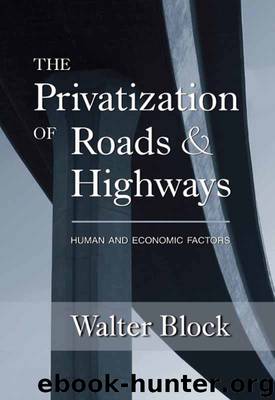The Privatization of Roads and Highways by Walter Block

Author:Walter Block [Walter Block]
Language: eng
Format: epub, mobi
ISBN: 978-1-93355-004-6
Publisher: Ludwig von Mises Institute
Published: 2009-09-28T16:00:00+00:00
Part III
Process
10
Privatize Public Highways*
Across the United States, more than four million roads, streets, and highways tie cities and states together and enable citizens to work, travel, and shop. Americans enjoy unprecedented freedom and convenience, as our whole economy is directly dependent upon this mobility. This makes the entire nation, in effect, one gigantic assembly line for the production and transport of goods.
Because of the importance of the U.S. transportation system, many believe that only the government can own and manage it. This is not the case. Privatization of the public highway system would provide economic efficiencies and other benefits.
Private ownership, which would include competitive roads owned by people and corporations that can charge tolls, would allow the incentive for profit to benefit consumers, as it does in other areas of our lives. We would see the results in increased safety, reduced traffic congestion, and, of course, tax savings.
The public highway system is a prime example of a public firm that is large in size, lax in management, and a costly burden to taxpayers. Public highways are suffering from problems of urban traffic congestion, poor maintenance, and high fatalities. The demands on road systems are continually changing in a society where in months a new shopping center, office complex, or residential area can appear.
According to the American Public Works Association, Americans spend more than two billion hours tied up in traffic on urban highways each year. The Federal Highway Administration (FHA) estimates that over the next twenty years travel on public highways will rise by two-thirds, adding even more strains to an already overburdened system. The FHA also estimates that over 234,500 miles of U.S. roads are in either poor or mediocre condition.
Every year, thousands of people lose their lives in highway accidents. Fatal crashes are variously attributed to vehicle speed, intoxication of the driver, lack of safety regulations, or mechanical failures. These are proximate causes, but government management and control are major factors as well. While there will always be some accidents, as long as customers want safety, private owners will compete to provide it. If a good safety record on a road attracted customers, it would be in the interest of owners to provide it.
Owners of airlines know the importance of safety and regular maintenance of their aircraft, for they face the consequences when safety fails. If the cause is believed to be the airline’s, customers choose another carrier. As a result, air transportation is extremely safe.
But today’s highway monopoly means that there is no monetary incentive for government to improve its safety record. People have to drive regardless of the safety of the road.
Download
The Privatization of Roads and Highways by Walter Block.mobi
This site does not store any files on its server. We only index and link to content provided by other sites. Please contact the content providers to delete copyright contents if any and email us, we'll remove relevant links or contents immediately.
The Secret History by Donna Tartt(19090)
The Social Justice Warrior Handbook by Lisa De Pasquale(12190)
Thirteen Reasons Why by Jay Asher(8912)
This Is How You Lose Her by Junot Diaz(6887)
Weapons of Math Destruction by Cathy O'Neil(6281)
Zero to One by Peter Thiel(5802)
Beartown by Fredrik Backman(5755)
The Myth of the Strong Leader by Archie Brown(5508)
The Fire Next Time by James Baldwin(5446)
How Democracies Die by Steven Levitsky & Daniel Ziblatt(5219)
Promise Me, Dad by Joe Biden(5153)
Stone's Rules by Roger Stone(5088)
A Higher Loyalty: Truth, Lies, and Leadership by James Comey(4964)
100 Deadly Skills by Clint Emerson(4926)
Rise and Kill First by Ronen Bergman(4789)
Secrecy World by Jake Bernstein(4753)
The David Icke Guide to the Global Conspiracy (and how to end it) by David Icke(4720)
The Farm by Tom Rob Smith(4514)
The Doomsday Machine by Daniel Ellsberg(4490)
